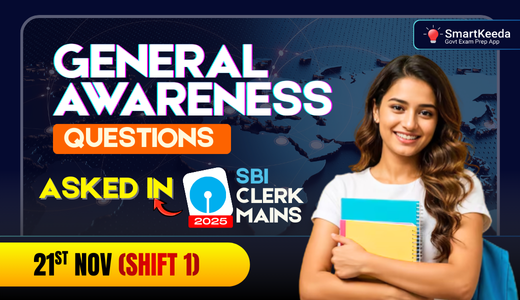5- Mistakes that Might lead you Towards Failure in Bank Exams
A career in the banking industry is widely preferred among graduates because of the attractive packages, career opportunities, and numerous benefits and allowances provided by the banks to their employees. In terms of financial stability and employment security, the banking industry is among the top professions.
But the majority of bank aspirants have this pressing question in their minds. Are bank exams very difficult? If you ask a banking aspirant you will find that the difficulty level of these exams is not very high. The questions asked in the prelims of these exams are of a basic level. Still, thousands of candidates are not able to clear even this round. If the syllabus covered in these exams is of a basic level, what makes these exams a hard nut to crack? Why do a lot of candidates fail miserably in clearing the cutoff of these exams? What are some of the common mistakes these candidates make during their preparation that sieve them out of the lot?

First of all, the competition for bank exams is fierce, with thousands of applicants vying for a few hundred seats. The limited number of seats available is one of the biggest challenges faced by candidates, which makes it tough to crack the exams. This creates a lot of pressure on the candidates, who have to perform exceptionally well to secure a spot. However, this is one of the external factors and is beyond our control.
Apart from that, the ambition of working in the banking sector becomes a nightmare for many candidates due to certain silly mistakes made by them. A lot of aspirants fail to clear the bank exams due to various other reasons such as poor knowledge of the pattern and syllabus, ineffective management of time, fear of failure, or not maintaining a positive attitude to clear these exams are some of the common reasons. Many aspirants do not have a clear study strategy, leading to confusion, stress, and poor performance.
In this article, we will discuss the 5-common mistakes made by aspirants that aspirants make that prevent them from achieving their goals.
1. Waiting for the Notification

This is the first and the biggest mistake made by the aspirants preparing for the banking exams. If you want to crack the exam on the first attempt, waiting for a notification to begin your exam preparation is definitely not recommended. Exam notifications can be unpredictable and sometimes a delay in the arrival of a notification can leave you with very limited time to prepare.
Instead of waiting for the notification, you should start preparing for the exam the moment you decide to get into your dream job. Starting early helps reduce the stress and pressure associated with exam preparation. When you have enough time to prepare, you can avoid cramming and last-minute preparation.
An early start will also allow you to cover the syllabus thoroughly at a comfortable pace and plan your preparation effectively while including mock tests in your schedule so that you have enough time to analyze and work on your weaknesses at the right moment. This also allows for better retention of information and understanding of concepts, which can prove to be beneficial during the exam.
- Click here to understand How to crack Bank Exams at Home without Coaching!
2. Not comprehending the Examination Pattern
Not going through the examination pattern of a particular exam before beginning the preparation is one of the common pitfalls made by aspirants during their exam preparation. A poor or no knowledge of the examination pattern can prove to be a classic blunder in your exam preparation journey.
Understanding the exam pattern simplifies the process for the aspirants. Having a clear idea of the exam pattern for that particular exam is one of the prerequisites to succeed in that exam. Knowing the exam format entails being aware of the pattern of the questions, the marking scheme, the time allotted for the exam, the number of sections, etc. Without knowing these specifics, it would be challenging to successfully prepare for and do well on the exam.

Understanding the examination pattern and syllabus is the first step in preparing for an examination and you must not miss this step at any cost. Although the syllabus and examination structure of most of the bank and insurance exams is almost similar, there is a minute difference in the examination pattern that must be considered. You must thoroughly analyze and understand the examination pattern, marking scheme, the number of questions in each section, and sectional qualifying score, before beginning your preparation.
Let us understand this with an example:
If we see the marking scheme of IBPS PO and IBPS clerk exams, the combined score of English Language, Quantitative Aptitude, and Logical Reasoning are considered to shortlist the candidates for the next round. However, this is not the case in the IBPS RRB Exam. English Language section is absent in the prelims of the IBPS RRB exam and hence you’re not required to practice this section.
Now if we talk about negative marking, there is a penalty of 0.25 marks for incorrect attempts in IBPS PO, Clerk, SBI PO, SBI Clerk, and RBI and LIC ADO exams. Whereas In LIC AAO, there is no negative marking. Also, the English Language test is qualifying and the marks obtained in the English Language section are not counted for ranking.
A difference in the examination pattern demands an alteration in your strategy to clear that exam. If you’re not clear about the examination pattern in the first place, you may end up devoting your precious time to the wrong topics. This can negatively affect your performance in the exam and reduce your chances of success.
What to do?
You can use the previous year’s question paper to acquire information about that particular exam. A few things, such as the weight of marks, can also be established, which assists students in developing their preparation approach. You should go through the official notification of that exam and understand the key points including the examination pattern, marking scheme, qualifying sections, etc.
Attempting the mock tests of that particular exam is the best way to get yourself familiarized with the examination pattern of any exam. To help you prepare well for your actual exam, Smartkeeda online test series is specially designed as per the latest examination guidelines with a revised pattern of questions.
- Click here to know about the Best App for Bank Exam Preparation!
So, before beginning your study for any exam, it is crucial to carefully investigate and comprehend the new examination pattern. You should understand the examination pattern beforehand and tailor a study plan according to it so that you do not get baffled on the examination day.
3. Avoiding Mock Tests

Evaluation! Not attempting mock tests regularly or not evaluating your performance on a regular basis is one of the major mistakes that aspirants make. Candidates that are newbies in the field of competition are not aware of the benefits of attempting a mock test and hence avoid using mock tests in their preparation.
However, other aspirants miss this crucial step in their preparation journey due to several other reasons. Let us understand why many candidates avoid attempting mock tests:
- Under confidence
On the other hand, a lot of candidates are afraid of scoring miserably in a mock test as they get demotivated by their poor performance in a mock test. However, this fear of failure can prevent them from attempting a mock test and may result in poor performance in the actual exam.
- Overconfidence
Alternatively, some candidates feel that they have a good knowledge of the concepts and hence they will be able to apply them in the exam without practicing through mock tests. Mock tests serve many purposes than just confirming your knowledge. They also give a reality check to your time management techniques, speed, and accuracy, a lack of which might lead you toward failure.
What to do
You must first realize that mock tests are intended to gauge candidates' level of preparation and expertise. The greatest way to evaluate your preparation and how well you've reviewed your subjects is to routinely take mock exams. It also enables you to identify where your preparation fell short and the areas you should concentrate on to perform better on the test itself. The mock tests prepare your brain for the real exam and make sure that you're headed in the right direction.
Here we are suggesting you some tips that can help you motivate yourself to attempt mock tests regularly:
- If you’re a beginner, you need not pay much heed to the marks you obtain in a mock test. Just try to understand the examination pattern and the type of questions asked in the exam. Also, try to attempt the questions in the given time frame to learn time management.
- You can also set specific goals for yourself before attempting the mock test. Like, I will try to attempt 20+ questions in the quant section, or I would not make more than 10 incorrect attempts in this test. Having such goals in mind can give you a sense of purpose and help you stay motivated.
- Celebrate your small wins and progress. Every time you improve your score or complete a mock test within your target time frame, acknowledge and reward yourself. This can help you stay motivated and maintain a positive attitude toward your exam preparation.
- Do not make unrealistic goals. Make a weekly schedule in which you keep at least 3 mock tests in a week so that you can attempt the mock test analyze it and work on your weaknesses within that week itself.
4. Overattempting Mock Tests
Another common mistake made by the students during their preparation journey is over attempting mock tests. Many students have a false belief that a mock test is a panacea and that attempting mock tests is the only way to improve their scores. Therefore they attempt 10-20 mocks every week which is absolutely useless.

Therefore, performance analysis should be the immediate step after attempting a Mock test. You should take enough time to analyze them thoroughly. The analysis part will help you in improving your score. And ultimately, improving your score should be the objective.
How to Analyze Mock Tests?
To get the best analysis of your performance we recommend you attempt mock tests at Smartkeeda. If we talk about the analysis portion, the Smartkeeda test series is simply unmatched. We offer candidates incredibly thorough, error-free analytics reports on their performance, enabling them to quickly identify their weak points and work on them.
Step1: After finishing a mock test at Smartkeeda, first, move to the “Solutions” section and then check the following:
- A solution to the questions you marked incorrectly.
- Recheck if it was a calculation or conceptual mistake.
- A solution to your correct attempts to see if there is a better & time-saving method to solve those questions.
- Solutions to the question you skipped.
- See the time spent by you on your wrong attempts and list those topics.
Step 2: Now click on the “Go to Smart Analysis” Part of the Smartkeeda mock test series and analyze the following areas:
- My Performance Graph: Here you will get a graphical overall as well section-wise representation of your performance over the tests. Here you can see the consistency in your performance in terms of percentile, accuracy, and easy question selection.
- Strong & Weak areas: Here you should check the topics in each section, the difficulty level of the questions asked in those topics, and your speed, accuracy, and score in those topics. This will determine your topic strength in using Topic Tests. You can make a list of the topics where your topic strength is “Poor” and practice them through “Topic Tests by Smartkeeda”.
- Time management: In this section, you can get a clear idea of the topics that consumed most of your time. Here your time spent on correct, incorrect, and skipped questions is displayed in a graphical format. Also, your spent time is compared to the toppers.
- Which questions aren't worthwhile of your time?
- In order to save time, which questions should be approached first?
- Which question should be attempted later?
- What proportion of time should be assigned to each type of question?
- Speed & Accuracy: View the number of questions attempted by you in the first, second, third, and the last quarter and compare these stats to the topper. In the accuracy slot, check the number of questions accurately marked by you and get it compared with the topper’s attempts.
- Question Preference: This section will assist you in comprehending the questions that fell into the easy, moderate, or difficult categories, enabling you to identify and alter your preferred question types in order to maximize your score and save time.
Step 3: Take a full-length Reattempt of the test after working on your weak areas, and try to approach the questions using the improved strategies you learned during the analysis session. Use the "Your past vs. You" feature to compare your most recent performance with your past performance observe the following points:
- After going through the solution, how many more questions were you able to attempt?
- How much time did the new techniques save you?
- How quick & accurate were you on the second attempt?
- On the second attempt, what was your speed?
- Click here to understand the top features offered by Smartkeeda mock test series.
5. Awaiting the Prelims Result to Start Mains Preparation
Another big mistake is that the students wait for the results of the preliminary exam before starting to study for the main exam. A huge section of aspirants spends too much time on different websites reading the prelims analysis articles and worrying about cut-offs and searching for their chances of clearing prelims. They feel that their preparation for the main exam would go waste if they fail in the preliminary round.
In certain cases, the difficulty level of some shifts is high, which prevents candidates from performing up to expectations and causes them to forgo preparing for the following stage. Under such circumstances, the marks of the candidates who took the exam in the challenging shifts are normalized and therefore they are qualified for this round. In this situation, giving up immediately after prelims will only lead to more disappointment and missed opportunities.
The time difference between the prelims results and the mains exam in competitive exams like banking (IBPS, RBI, SBI) or other insurance exams is only 10-15 days, which is very less given the level of difficulty of this round.

“None of your efforts will go waste that you should be sure about, if not now you will see the results later”
For best outcomes, one should immediately begin Mains preparation after Prelims. Even if you do not clear prelims this time, this preparation would be extremely helpful in your other mains exams.
Final Word
Remember that clearing the bank exams requires more than just intelligence or knowledge. These exams require discipline, effort, and a positive outlook. Considering the fierce competition, you require a smart strategy to ace these exams with flying colours. Rigorous practice in the right direction will definitely help you realize your dreams.
Now that we have discussed the common mistakes made by banking aspirants in detail, it's time to buckle down and start preparing now!
Click here to attempt a free mock test now!
Thanks & Regards
(Team Smartkeeda)








